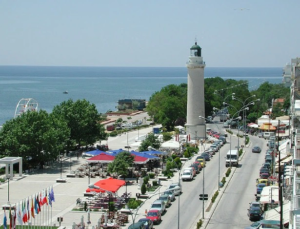Port of Alexandroupolis in global logistics NATO chain

 By Marek Grzybowski
By Marek Grzybowski
The port of Alexandroupolis became a strategic point in the Mediterranean Sea a year ago. The Americans chose this port as a strategic location on NATO’s logistic map.
The war in the Black Sea region and the blockade of Ukrainian ports caused not only changes in the logistics of grain, oil and gas. NATO’s military logistics also had to adapt to the new conditions. In the Mediterranean, overshadowed by Thessaloniki and Piraeus, and located in the north-eastern region of Greece, the port of Alexandroupoli has evolved into a key strategic logistics hub for NATO. This small port is used for the transit of supplies and weapons to Central Europe and Ukraine.
Greece has become one of the most important NATO countries in the Levant region. Turkey’s indistinct activity after Russia’s annexation of Crimea has become less attractive since Russia’s invasion of Ukraine and the war to develop military logistics behind the conflict. Located close to the border with Bulgaria and near the entrance to the Black Sea, the port of Alexandroupolis with good facilities for ro-ro services is an excellent place to perform logistics operations.
It must be clearly stated that it was the Americans chose this port as a strategic location on NATO’s logistic map.
On gas connection
The port also gained strategic importance when it was decided to locate an LNG terminal here, in which Bulgaria also participates. The former GasLog Chelsea LNG carrier with a capacity of 153,500 m3, which was built in 2010, will moor in Alexandroupolis.
It is the first FSRU conversion project operating in the Aegean Sea. Owned by GasLog, a partner of the Gastrade consortium, the ship has been rebuilt at the Keppel shipyard in Singapore since early February 2023. After installing additional regasification equipment, most of which has already been assembled, the ship will be handed over to the operator on November 8 this year.
A key place in NATO logistics
At the beginning of this year US Embassy Charge d’Affaires Maria Olson and US State Department Director of the Office of Southern European Affairs Josh Huck met with Mayor Yiannis Zamboukis, Evros Deputy Regional Director Dimitris Petrovits and Metropolitan Anthimos of Alexandroupoli, Traianopolis and Samothrace.
They also visited the Port Authority of Alexandroupolis and were informed by its president, Konstantinos Chatzimichail, about the plans to include the port in the energy security system of Greece and the region.
The port and the city are treated as a key link in European energy security, the participants of the meeting said, according to the Greek City Times.
The US Ambassador to Greece, George Tsunis, explicitly called Alexandroupoli “the essential passageway to the Western Balkans and the Black Sea”, while at the same time playing a key role in NATO’s security on its southern flank.
A key point in the region for NATO troops
Since the beginning of Russia’s invasion of Ukraine, the port has been a key maritime transfer point for supplying troops located on Ukraine’s western border. Weapons, food containers and humanitarian containers are delivered via this transit channel to Ukrainian citizens, as well as to Ukrainian refugees throughout Central and Eastern Europe, US sources emphasize.
The Americans use almost 100% of the infrastructure of Alexandroupolis, which includes infrastructure and terminal superstructure as well as the area of storage yards along with infrastructure and road and rail connections to the north of Central Europe. The port has been an important logistical support point for NATO’s eastern flank for several years.
U.S. Secretary of Defense Lloyd Austin publicly acknowledged Greece’s vital role in enabling “the expansion of U.S. forces in Greece in support of U.S. and NATO strategic access goals to the region,” especially in Ukraine.
Greece as a logistic and military link
“The United States saw an opportunity here [for logistics operations – MG] and we have been operating for about three years now,” said Andre Cameron, director of the Eastern Mediterranean Transportation Corps, 839th Transportation Battalion, 598th Transportation Brigade.
He emphasized that “U.S. and NATO forces are now using this port and we have continued to expand the port’s logistical capabilities with each mission,” said Aleksandra Shea of the 319 Mobile Public Affairs Detachment.
Cameron and his team coordinated the movement of military equipment and vehicles for US rotational forces in Eastern Europe and provided logistical support for the annual Defender Europe 23 exercise.
With the cooperation of Greek Army forces, local community leaders and port authority personnel, more than 600 units of US military equipment and vehicles were loaded and unloaded from US ARC Endurance and ARC Integrity cargo ships.
A small port with great logistical potential
Until recently, the port of Alexandroupoli was intended for privatization. More than a year ago, the Greek government canceled the privatization of the port by selling 67% of the shares.
The decision was justified by the fact that the port is too valuable to relinquish ownership control. Russia’s invasion of Ukraine and investments in strategic infrastructure made the government withdraw from the idea.
In May this year The Greek government has received €24 million in funding from the European Union for the modernization of the port of Alexandroupoli in the Aegean Sea, the HRADF privatization agency reported.
EU funds will be used for dredging and construction of road infrastructure, the HRADF said in a statement, adding that work on a business plan for the project is already underway.
The above analysis leads to the conclusion that even a small port can fulfill important strategic tasks, and ownership decisions must be considered in a broader perspective. It is worth taking this into account when building strategies for seaports.
